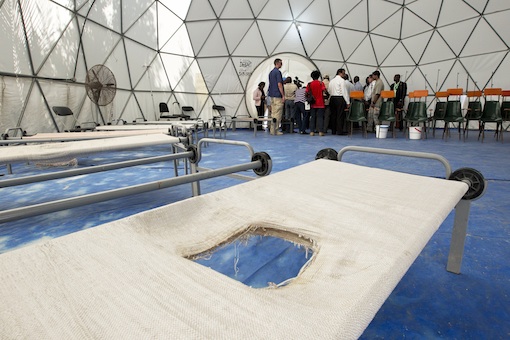Above: a cholera treatment centre in Haiti (UN Photo/Logan Abassi)
By the Caribbean Journal staff
Cholera treatment in Haiti has been “crippled” by a lack of funds and supplies, according to medical humanitarian group Doctors Without Borders.
That has led to “unnecessary” deaths and has increased the risk of further outbreaks during the upcoming rainy season in Haiti, the group said in a release.
“Some of the staff at the cholera treatment centres have not been paid for several months,” said Dr Mamady Traoré, MSF deputy medical coordinator. “Infrastructure and equipment are worn out because they haven’t been maintained and there are frequent shortages of medical supplies. As a result, hygiene precautions that are essential to limiting the spread of the disease are no longer enforced.
In Haiti’s North department, deaths related to cholera have increased since the end of 2012, with a mortality rate topping 4 percent in certain centres.
“Sometimes patients are left without treatment or must pay to obtain it,” she said. “That is intolerable.”
Late last year, the United Nations expanded its anti-cholera initiative, appealing for as much as $2.2 billion to fund Haiti’s government’s plan to eliminate cholera by 2022. (The latter plan was officially released last month.
“Cholera now appears to be seen as a development issue to be resolved over the next 10 years, whereas the current situation still calls for an emergency medical response,” said Duncan McLean, MSF program manager in New York. “The necessary resources for such a response are becoming increasingly scarce.”
MSF said it had treated almost 200,000 patients in Haiti at a cost of $60 million since 2010.
The organization said its treatments had a mortality rate of below 1 percent in that period.
“Prevention—by improving water, sanitation, hygiene conditions and vaccinations—is obviously the long-term solution, but sufficient resources are still needed today to treat patients and prevent deaths,” said Oliver Schulz, MSF head of mission in Haiti. “The priority today must be to strengthen the treatment centers and the early warning and rapid response systems. The Haitian government and international donors need to ensure that existing treatment sites are equipped and staffed before the rains. That means as soon as possible.”
